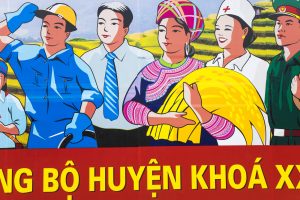Vietnam has confirmed its top leadership appointments for the coming five years, selecting a career member of the security forces to serve as the country’s next prime minister.
On Monday, Vietnam’s National Assembly voted to make Pham Minh Chinh the new head of government, while shuffling his predecessor Nguyen Xuan Phuc over to the largely ceremonial post of president.
Coming a week after the country’s nearly 500 lawmakers approved Vuong Dinh Hue, an experienced economist, as the next chairman of the National Assembly, the votes completed the quinquennial renewal of Vietnam’s four highest ranking leadership posts.
Lacking a paramount leader, Vietnam is led by the “four pillars”: the general secretary of the Vietnamese Communist Party (VCP), the prime minister, the president, and the chair of the National Assembly.
None of Monday’s selections was surprising; the votes affirmed selections that the VCP made during its 13th Party Congress, which were leaked to the press even before the congress met in late January.
The most dramatic development at the congress was the appointment of the 76-year-old Nguyen Phu Trong to an unusual third term as General Secretary of the VCP, primus inter pares of the four top leadership posts.
Trong will now be seconded by Chinh, 14 years his junior, who has risen vertically through Vietnam’s powerful security apparatus. He was formerly head of the VCP’s Central Organization Commission, which is involved with internal personnel management, and also served as deputy minister of the Ministry of Public Security, which is tasked with everyday policing and responsible for the Party’s recent harsh crackdown on dissent.
Chinh is also notable for being the Vietnamese prime minister not to have previously served as a deputy prime minister since the launch of the doi moi economic reforms in 1986 – another norm that was stretched at this year’s Congress. One of the reasons for these diversions from the norm, analysts have argued, was the difficulty in balancing the various internal factions within the Party, something that also explained Trong’s appointment to an unexpected third term as Party chief.
The appointment of Chinh suggests that the coming five years is unlikely to be marked by any significant breaks in Vietnam’s political trajectory. As Zachary Abuza wrote in these pages in February, there was “a tremendous degree of continuity in both the composition of the new Politburo, the highest decision making body in the country, and the policies it is expected to pursue.”
The selection of a security official to head the Vietnamese government until 2026 suggests a continuation of the “blazing furnace” campaign to eradicate corruption, a hallmark of Trong’s second term as VCP chief, as well as a continuation of the Party’s recent harsh repression of the country’s pro-democracy movement. As Abuza wrote, “the 13th Politburo still reflects Trong’s imprimatur, including the Party’s recent brutal crackdown on dissent.”
As prime minister, Chinh will face a host of challenges, from economic recovery from the COVID-19 pandemic to the perennial dilemma of how to handle relations with China, a hugely important economic partner with which Vietnam nonetheless has a host of issues, from disputes in the South China Sea to the effect of Chinese dams on the Mekong Delta, all of which have made China deeply unpopular with a large swathe of the Vietnamese public.
Indeed, this is something with which Chinh has some experience. From 2011 to 2015, he served as Party chief in Quang Ninh province, which borders China. During that time, he pushed for the establishment of a Special Economic Zone, one of three that were planned for the northern, central, and southern regions of the country. In 2018, the SEZs became the subject of widespread protests out of fear that they would act as bridgeheads for a Chinese colonization of Vietnam, forcing the government to cancel them.

































